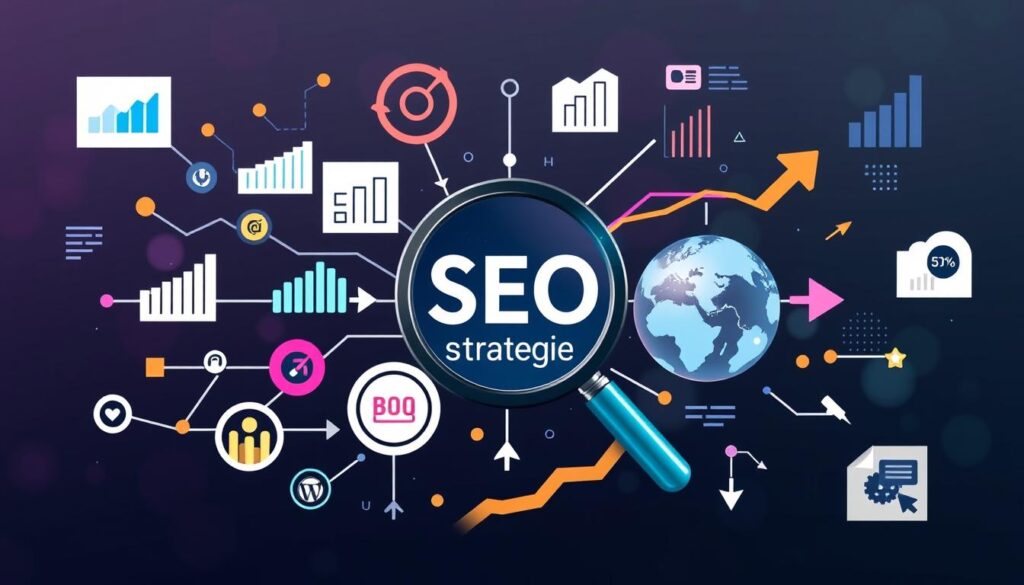Did you know 93% of online experiences start with a search engine? This shows how important search engine optimization (SEO) is for any website. By making your site better for search engines, you can get more visitors, attract better leads, and boost sales.
SEO is about making your website more likely to show up in search results. It involves things like finding the right keywords, making your content better, and improving your site’s technical side. Good SEO can really change how people see your website and help your business grow. In this guide, we’ll look at how SEO can help your website and business succeed.
Key Takeaways
- Search engine optimization (SEO) is key for making your website more visible, getting more traffic, and improving user experience.
- Good SEO can lead to better rankings, more conversions, and higher sales.
- Strategies like keyword research, content optimization, and technical site improvements are vital for SEO success.
- Keeping up with search engine changes is important for keeping your SEO effective.
- Working with an experienced SEO expert or agency can help your business grow online.
What is Search Engine Optimization (SEO)?
SEO, or search engine optimization, makes a website more visible and ranked higher in search results. It improves a site’s content, structure, and technical parts. This makes it easier for search engines like Google to find and rank it. SEO is key in digital marketing, helping businesses get more visitors, increase brand awareness, and boost sales.
Understanding the Role of SEO in Digital Marketing
Today, search engines are the main way people find things online. A 2019 BrightEdge study found that 53% of all website traffic comes from organic search. With Google dominating the search market and handling over 8.5 billion searches daily, SEO’s role is huge.
SEO helps businesses reach more customers, drive traffic, and grow their brand. It also helps get more customers, improve reputation, and increase ROI. The global SEO market is expected to hit $122.11 billion by 2028, showing the need for good SEO strategies.
- On-page SEO: Improves website content, structure, and metadata for better visibility and relevance.
- Off-page SEO: Builds quality backlinks and online citations to boost domain authority.
- Technical SEO: Optimizes a website’s technical setup for search engines.
By applying these SEO basics, businesses can use search engines to find their audience. This drives more relevant traffic and helps meet digital marketing goals.

Benefits of Optimizing for Search Engines
Search engine optimization (SEO) is a powerful tool for businesses. It helps improve a website’s visibility in search engine results. This can open up many opportunities that can boost a company’s bottom line.
One key benefit of SEO is the potential to drive more website traffic. Studies show that over 90% of the traffic goes to the first page of a Google search. By optimizing content and technical aspects, businesses can attract more potential customers.
SEO also helps in generating more leads and sales. Nearly 80% of local searches on mobile lead to conversions. SEO attracts prospects at any stage of the buying funnel, not just based on demographics.
| Benefit | Statistic |
|---|---|
| Website Traffic | Over 90% of the traffic goes to results appearing on the first page of a Google search. |
| Lead Generation | Nearly 80% of local searches on mobile lead to conversions. |
| Sales | Search engines offer a close rate of almost 15 percent for new leads, compared to traditional marketing which is less than two percent. |
| Marketing Costs | SEO does not require direct costs like pay-per-click, making it a cost-effective marketing strategy. |
SEO can also help reduce marketing costs compared to traditional ads. Unlike PPC, SEO doesn’t have direct costs. It’s a cost-effective way to grow online presence and reach. SEO and PPC can also work together to improve search engine results.

Investing in SEO can give a business a competitive edge. Competitors who ignore SEO may fall behind in rankings. It’s crucial to keep up with SEO trends and best practices to stay ahead and attract more people.
How Does SEO Improve your Website?
Search engine optimization (SEO) is a powerful tool that can make your website better. It helps your website rank higher in search engines. This makes it easier for people to find and use your products or services.
SEO improves your website by making your content better and more relevant. Content quality is identified as the number one driver of search engine rankings. By using the right keywords in your content, you can attract more visitors.
Technical SEO also matters a lot. It includes making your website easy to navigate and fast on mobile devices. Pages on the top of Google’s first page load significantly faster than those at the bottom. This shows how important speed and technical optimization are for a good user experience.
SEO also helps make your website more visible and trustworthy. Implementing Schema.org markup has shown to influence content crawl rates and SERP presence. Link-worthy websites with rich, authoritative content are more likely to attract links from other sites, improving SEO. By creating valuable content and getting more backlinks, you can improve your website’s ranking and show you’re an expert in your field.
In the end, a good SEO strategy can really help your website. It can make your website better, more user-friendly, and more successful. By always improving your SEO, you can keep your online presence strong and effective.

“Optimizing for mobile and technical SEO, like compressing images and organizing URL structure, enhance website performance.”
Creating SEO-Friendly Content
Making your website’s content SEO-friendly is crucial for better search rankings. Start with keyword research to find out what people are looking for. Use these keywords in your content to make it more visible and relevant online.
Keyword Research and Optimization
Good keyword research looks at search volume, competition, and how well it fits your business. Google’s Keyword Planner is a great tool for finding top keywords in your field. Then, add these keywords to your content in a way that feels natural and adds value to your readers.
Content Quality and Relevance
Search engines love content that’s high-quality, informative, and fun to read. Create content that’s accurate, original, and meets your audience’s needs. This way, you’ll make your website more useful and improve your search rankings.
It’s important to make content that both search engines and people will like. Finding this balance will help you reach your content goals and get more visitors to your site.

“Quality content is the key to better search engine rankings and a stronger online presence.”
Technical SEO Considerations
Technical SEO is key to making a website more visible and perform better in search results. Things like website structure, navigation, and technical setup affect how well search engines can crawl and index a site. A clean, organized site structure and easy navigation improve user experience and show search engines the site is trustworthy.
Website Structure and Navigation
A website that’s easy for search engines to crawl and index is crucial. A clear, organized page structure helps search engines understand the site’s layout. This makes it easier for them to find and index content. A good navigation system with clear links and sitemaps also helps search engines move around the site efficiently.
Here are some important technical SEO tips for website structure and navigation:
- Make sure your website’s structure is logical and easy to follow.
- Reduce the number of orphan pages to improve crawlability.
- Use an XML sitemap to help search engines find and index all important pages.
- Ensure your navigation is consistent and easy to use, with clear labels and links.
- Optimize your URL structure to make it easier for search engines to read.
- Use redirects to handle any changes in page URLs or domain structure.
- Fix any duplicate content issues, like ensuring only one version of the website is accessible.
By focusing on these technical SEO aspects, website owners can boost their site’s visibility and performance in search results. This leads to a better user experience and more targeted traffic to their online presence.
| Technical SEO Factor | Importance | Impact on Search Visibility |
|---|---|---|
| Website Structure | High | A clear hierarchy and organization help search engines understand and index the website more effectively. |
| Navigation | High | Intuitive navigation and sitemaps assist search engines in discovering and crawling all important pages. |
| URL Structure | Medium | Optimized URLs can improve readability and searchability for both users and search engines. |
| Redirects | High | Proper redirects ensure search engines can find updated content and avoid issues like duplicate content. |
| Duplicate Content | High | Addressing duplicate content prevents search engines from wasting crawl budget and improves indexation. |
Link Building Strategies
Link building is key to off-page SEO. It’s about getting high-quality backlinks from other websites. These links show search engines that a site is trustworthy and full of good info. Good link building can boost a site’s ranking and visibility online.
Guest posting is a strong tactic. Writing for other blogs in your field can get you valuable backlinks. Digital PR is also effective. It involves working with influencers and media to get links from top sites.
Outreach is also vital. It means finding and talking to site owners and creators. This can lead to backlinks or partnerships.
| Link Building Tactic | Benefits |
|---|---|
| Guest Posting | Earns backlinks from industry-relevant websites, boosts authority and credibility. |
| Digital PR | Secures backlinks from high-authority domains, enhances brand visibility and reputation. |
| Outreach | Allows businesses to identify and connect with relevant website owners and content creators for link opportunities. |
Using these strategies can make your off-page SEO stronger. This can lead to better rankings and more visitors to your site.
“Link building is not just about acquiring links, but rather about building relationships and creating valuable content that others will want to share and link to.” – SEO Specialist, John Doe
Mobile Optimization and User Experience
In today’s world, mobile devices are a big part of our lives. Making your website mobile-friendly is now essential. Mobile optimization boosts user experience and helps your site rank better in search engines.
Responsive Design and Page Speed
Responsive design is key for mobile optimization. It makes sure your site works well on all devices. Also, page speed matters a lot. Slow sites can lose users and hurt your search rankings.
More people now use mobiles than desktops for internet. This change has made Google focus more on mobile-friendly sites. They want to give mobile users a good experience.
- Responsive design ensures your website adapts to various screen sizes and devices, providing a consistent and accessible user experience.
- Optimizing page speed is crucial, as slow-loading pages can negatively impact user engagement and search engine rankings.
- Google’s “mobile-first” approach means that the mobile version of your website is now the primary consideration for ranking purposes.
By focusing on mobile optimization, you can make your site better. This will also help you show up more in search results. More people will then visit your site, which could lead to more customers.
Measuring and Analyzing SEO Success
It’s key to measure and analyze your SEO success. This helps you make smart decisions and improve your website. By tracking SEO metrics like search rankings, website traffic, and conversion rates, you learn a lot. This knowledge helps you boost your search engine visibility and online performance.
Watching organic traffic is crucial. Google Analytics can show you how your SEO brings visitors to your site. Also, keyword rankings and SERP visibility tell you how well your site shows up in search results. This info helps attract more visitors.
Impressions are another important metric. They show how often your site appears in search results. Google Search Console can help you see how to boost your click-through rate (CTR). This means making your site more appealing in search results.
| Metric | Description |
|---|---|
| Organic Traffic | The number of visitors who arrive at your website through unpaid search results. |
| Keyword Rankings | The position of your website in search engine results for specific keywords. |
| SERP Visibility | The frequency and placement of your website in search engine results pages. |
| Impressions | The number of times your website appears in search engine results. |
| Click-Through Rate (CTR) | The percentage of users who click on your website from search engine results. |
Also, tracking conversion rate, bounce rate, and other key indicators is important. These metrics help you see if your site is good at turning visitors into customers. Knowing these numbers lets you improve your site’s content and user experience.
Keeping an eye on your SEO performance is vital. It helps you stay ahead and adjust to changes in search engines. By using all the data you can, you can keep making your strategies better. This leads to more growth for your business.
Staying Up-to-Date with SEO Trends
In the fast-changing world of digital marketing, keeping up with SEO trends is key. The search engine world is always shifting, thanks to algorithm updates and industry changes. Businesses need to be quick and flexible to stay ahead.
The focus on being real and having first-hand knowledge is growing. The 2023 EEAT guideline update emphasizes content from experts. This shows how important it is to build a strong online presence and be seen as a trusted name in your field.
Adapting to Algorithm Updates and Industry Changes
To stay on top, keep an eye on industry news and join SEO communities. This way, you can learn about new algorithm updates and adjust your SEO strategies. Always be ready to try new things and improve your site’s search ranking.
- Regularly review and update your content to ensure it aligns with the latest search engine best practices.
- Invest in tools and technologies that can streamline your SEO efforts, such as AI-powered content generation and optimization.
- Collaborate with industry experts and participate in SEO communities to stay informed about emerging trends and best practices.
By being open to change and always looking to improve, your business can succeed in the changing SEO world.
“The only constant in the world of SEO is change. Businesses that can adapt quickly and stay ahead of the curve will thrive in the long run.”
Hiring an SEO Professional or Agency
Improving your website’s search engine visibility can be a game-changer. Hiring a SEO professional or SEO agency can offer big advantages. They have the know-how to create customized strategies that fit your business perfectly.
With the help of SEO professionals, your website can climb the search engine ranks faster. You’ll attract better leads and see better results. But, be careful when picking an SEO agency. Some use unethical or unsustainable SEO tactics that can hurt your site.
To find a reliable effective SEO service, look for agencies with a solid reputation. They should be open and focused on their clients. Good feedback is a must, and they should explain their plans clearly.
| Service | Average Monthly Cost |
|---|---|
| SEO Agency | $2,917 |
| SEO Consultant | $3,250 |
| SEO Tools | $400+ |
While an SEO professional or agency might cost more at first, the benefits last long. An effective SEO strategy includes content, customer experience, media, and web design. These can boost rankings, increase traffic, and improve your business overall.
“Look for agencies that understand SEO and growth marketing to improve rankings and customer experience.”
Conclusion
Implementing effective search engine optimization (SEO) strategies is key for businesses. It helps improve their online visibility, drive targeted website traffic, and boost business growth. By optimizing content, technical elements, and user experience, businesses can climb higher in search engine rankings. This attracts more qualified leads, leading to more sales and revenue.
Whether done in-house or by hiring an SEO expert, a good SEO strategy is powerful. It drives long-term website performance and success. Keeping up with the latest SEO trends and best practices helps businesses stay ahead in the digital world.
Investing in SEO is a smart move for businesses of all sizes. It can lead to better online visibility, more customer engagement, and stronger business growth. By focusing on SEO, businesses can open up new opportunities for success. They can also set themselves up for long-term growth in the digital marketing world.
FAQ
What is search engine optimization (SEO)?
SEO is about making a website better for search engines. It involves improving content, structure, and technical parts. This makes the site easier for search engines to find and rank.
How does SEO improve a website’s performance?
SEO boosts a website’s performance and user experience. It makes the site more visible in search results. This helps more people find and use the site, leading to better business results.
What are the benefits of optimizing a website for search engines?
Optimizing a website for search engines brings many benefits. It attracts more customers and increases sales. SEO is also cheaper than traditional ads, helping businesses grow online.
How does SEO-friendly content creation impact a website’s search engine rankings?
Creating SEO-friendly content is key to better rankings. It involves using the right keywords naturally. High-quality, relevant content also boosts the site’s credibility with search engines.
What are the key technical SEO considerations for improving a website’s visibility?
Technical SEO is important for better visibility. It includes website structure and navigation. A clean, organized site signals trustworthiness to search engines.
How can link building strategies contribute to SEO success?
Link building is vital for off-page SEO. It gets high-quality backlinks from other sites. This shows search engines the site is trustworthy. Good link building strategies improve rankings and visibility.
Why is mobile optimization important for SEO?
Mobile optimization is crucial with more people using mobile devices. A responsive design and fast loading times improve user experience. This also helps search engines see the site as user-friendly.
How can businesses measure and analyze the success of their SEO strategy?
Tracking SEO metrics is key to success. It shows how well strategies work. This helps make better decisions and improve performance.
How can businesses stay up-to-date with the ever-changing SEO landscape?
SEO changes often, so staying current is important. Keep up with trends and adapt strategies. This ensures success in search rankings.
Should businesses hire an SEO professional or agency?
Hiring an SEO expert can be beneficial. They have the knowledge to create effective strategies. This can lead to better search visibility and results.
